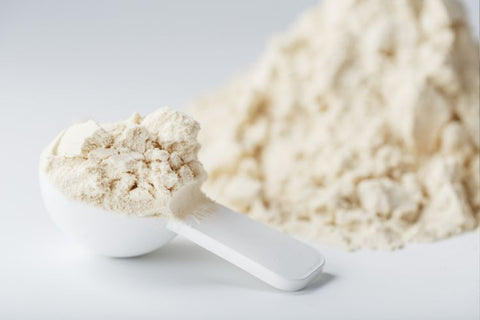The question of whether casein protein causes inflammation has sparked considerable interest and debate within the realm of nutrition and health. While some studies suggest a potential link between casein consumption and inflammatory responses, the relationship is far from straightforward.
This article aims to delve into the complexities surrounding the interaction between casein protein and inflammation, exploring various factors that contribute to individual variability in this regard. From understanding casein's immunogenic properties to examining its role in autoimmune conditions and considering the influence of digestive processing and gut microbiota, we will explore the multifaceted nature of this topic.
Immunogenic Properties of Casein
Inflammation is a complex bodily process, but sometimes even common foods can contribute to it. Casein, a major milk protein, has immunogenic properties that can trigger inflammation in certain individuals. Let's find out how casein's interaction with the immune system can lead to inflammatory responses.
- Immunogenicity: Casein can be recognized by the immune system in some people as a foreign substance. This triggers an immune response, similar to how the body fights off an infection.
- Hypersensitivity: In individuals with a casein allergy or intolerance, the immune system overreacts to casein. This can lead to the release of inflammatory molecules like histamine, causing symptoms like bloating, cramps, and diarrhea.
- Bowel Involvement: In some cases, casein may disrupt the gut barrier, allowing larger casein molecules to pass through the intestinal lining and further activate the immune system in the tissues beneath. This can contribute to chronic low-grade inflammation.
Allergic Reactions and Inflammation
Casein allergy and intolerance can cause a variety of inflammatory reactions, often mimicking other digestive issues. Here's a breakdown of common symptoms:
Digestive
Upset stomach: Nausea, vomiting, diarrhea, cramps, and bloating are all frequent signs of inflammation in the digestive tract triggered by casein.
Skin
Hives, eczema, and itchy, red rashes are common allergic reactions to casein. These can appear anywhere on the body but often affect the face and arms.
Respiratory (less common)
Nasal congestion, sneezing, runny nose, coughing, and wheezing can occur in some cases, especially if the inflammation affects the airways.
Severe Reaction (anaphylaxis)
In rare instances, casein allergy can trigger anaphylaxis, a life-threatening reaction causing swelling of the lips, tongue, and throat, along with difficulty breathing. This requires immediate medical attention.
Casein's Role in Autoimmune Conditions
The potential link between casein protein and autoimmune conditions is a topic of ongoing research with some intriguing possibilities, but it's important to understand the current understanding:
Potential Role
- Molecular Mimicry: Casein, particularly a specific type called A1 beta-casein, has a molecular structure that can resemble some human proteins. This "mimicry" might confuse the immune system in some individuals, leading it to attack both the casein and the body's tissues, potentially contributing to autoimmune reactions.
- Leaky Gut: Some theories suggest that casein may disrupt the gut barrier, allowing larger casein molecules to enter the bloodstream and trigger an immune response. This chronic activation could be linked to autoimmune flares in susceptible individuals.
Individual Variations
- Genetics: Genetic predisposition likely plays a role in who experiences autoimmune conditions. Variations in genes related to immune function might influence how individuals react to casein.
- Gut Health: Pre-existing gut issues or imbalances in gut bacteria could make individuals more susceptible to the potential inflammatory effects of casein.
- Type of Casein: Some research suggests A1 beta-casein may be more problematic than A2 beta-casein, found in some cow's milk and other dairy sources.
Digestive Processing and Inflammation
The digestion of casein involves breaking down the protein into smaller peptides and amino acids. In some cases, incomplete digestion or sensitivity to certain casein fragments may lead to an inflammatory response. Here’s how:
1. BCM-7 (beta-casomorphin-7) Formation
- During digestion, casein breaks down into smaller peptides. In milk containing A1 beta-casein (common cow's milk), a specific peptide called BCM-7 can be formed.
- BCM-7 has opioid-like properties and might bind to opioid receptors in the gut, potentially disrupting gut function and increasing intestinal permeability.
- This increased permeability, often referred to as "leaky gut," allows larger casein molecules to pass through the intestinal lining and enter the bloodstream.
2. Immune System Activation
- Once casein fragments like BCM-7 enter the bloodstream, they can be seen as foreign by the immune system in sensitive individuals.
- This triggers an immune response, leading to the release of inflammatory molecules like cytokines.
- Chronic low-grade inflammation can result, potentially contributing to various inflammatory conditions.
Influence of Gut Microbiota
The interplay between casein, gut microbiota, and inflammation is a fascinating area of research with emerging evidence. Here's how they might influence each other:
Casein's Impact on Gut Microbiota
- Nutrient Source: Casein breakdown products like peptides can act as a food source for certain gut bacteria. This can influence the overall composition of gut microbiota.
- Selective Growth: Some gut bacteria might be better equipped to utilize casein-derived nutrients, potentially leading to their overgrowth and disrupting the delicate balance of gut microbes.
Gut Microbiota's Role in Inflammation
- Barrier Function: A healthy gut microbiota helps maintain a strong gut barrier, preventing the passage of harmful substances and inflammatory triggers.
- Immune Modulation: Gut bacteria communicate with the immune system, influencing its response. An imbalance in gut microbiota can lead to a pro-inflammatory state.
Potential Inflammatory Pathway
- When casein disrupts the gut microbiota balance, it might promote the growth of bacteria that can weaken the gut barrier.
- This allows larger casein fragments or bacterial products to leak into the bloodstream, triggering an immune response and inflammation.
Impact of Processing Methods
Not all Casein are created equal. Casein, a milk protein, can trigger inflammation in some individuals. But did you know the processing methods used on casein might influence its inflammatory potential? Let's explore how different processing techniques can alter casein's structure and potentially affect its interaction with the body's inflammatory response.
- Fermentation: Processes like yogurt production utilize bacterial fermentation, which can break down BCM-7 precursors, potentially reducing its formation in the final product.
- Hydrolysis: Hydrolysis involves breaking down casein into smaller peptides or amino acids. Depending on the specific process, this can potentially reduce the presence of BCM-7 precursors or other inflammatory triggers.
- Aging: Traditionally aged cheeses allow for some natural breakdown of casein, potentially affecting the presence of BCM-7 precursors. However, more research is needed to confirm this.
Considering Casein in a Balanced Diet
In a balanced diet aimed at modulating inflammation, casein's impact needs to be considered on a personal level, with careful attention to both the potential benefits and drawbacks:
- High-Quality Protein: Casein is a complete protein containing all essential amino acids necessary for building and repairing tissues.
- Sustained Release: Casein has a slow and steady digestion rate, promoting feelings of satiety and potentially helping regulate blood sugar levels.
- Inflammatory Response (for some): As discussed earlier, casein might trigger inflammatory responses in some individuals due to factors like BCM-7 formation or gut dysbiosis.
Considering Casein in a Balanced Anti-Inflammatory Diet
- Individualized Approach: It's crucial to assess your tolerance to casein. Listen to your body's response after consuming casein-containing foods.
- Focus on Whole Foods: Prioritize a diet rich in fruits, vegetables, whole grains, and healthy fats - these offer a wealth of anti-inflammatory nutrients.
- Alternative Protein Sources: If casein seems problematic, explore alternative protein sources like fish, poultry, legumes, nuts, and seeds.
- Consider Processing Methods: Opt for casein products like yogurt or aged cheeses if concerned about BCM-7 content, but remember, research on processing methods is ongoing.
- Fermented Foods: Include fermented foods like yogurt, kefir, and kimchi in your diet. These promote a healthy gut microbiome, which can potentially mitigate casein's inflammatory effects.
Individual Health Conditions and Casein
Casein and inflammatory bowel diseases (IBD) like Crohn's disease and ulcerative colitis present a complex interaction. Here's a breakdown of what we know and dietary recommendations to consider:
Potential Impact of Casein in IBD:
- Increased Inflammation: For some IBD sufferers, casein might worsen inflammation due to factors like BCM-7 formation or gut barrier dysfunction.
- Hypersensitivity: A minority of IBD patients might have a true casein allergy, triggering an immune response that exacerbates symptoms.
Dietary Advice for IBD and Casein:
- Individualized Approach: The impact of casein on IBD can vary significantly. Elimination diets and close monitoring of symptoms are crucial to assess individual tolerance.
- Elimination Diet: Under a doctor's supervision, temporarily eliminating dairy products, including casein, can help identify if it triggers symptoms. Reintroduction can then gauge sensitivity.
- Alternative Protein Sources: If casein is problematic, explore protein sources like fish, poultry, legumes, nuts, and seeds to ensure adequate protein intake.
- Focus on Gut Health: Prioritize a diet rich in fruits, vegetables, and whole grains to promote a healthy gut microbiome, potentially aiding in managing inflammation.
- Consider Processing Methods: If some dairy tolerance exists, fermented dairy products like yogurt or kefir might be better tolerated due to the potential breakdown of BCM-7. However, individual responses may vary.
To sum it up
The relationship between casein protein and inflammation is multifaceted, influenced by various factors including immunogenic properties, digestive processing, gut microbiota, autoimmune conditions, and processing methods. While casein can trigger inflammatory responses in some individuals, a balanced approach to diet and careful consideration of individual tolerance can help mitigate potential adverse effects.
Key Takeaways
- Casein protein can trigger inflammation in certain individuals due to its immunogenic properties and potential disruption of the gut barrier.
- Allergic reactions to casein may manifest as digestive issues, skin reactions, respiratory symptoms, or even severe anaphylaxis.
- Autoimmune conditions like molecular mimicry and leaky gut are areas of ongoing research regarding casein's role in inflammation.
- Incomplete digestion of casein can lead to the formation of inflammatory peptides like BCM-7, contributing to chronic low-grade inflammation.
- The gut microbiota plays a significant role in mediating the inflammatory effects of casein, influenced by factors such as nutrient source and selective growth.
- Processing methods like fermentation, hydrolysis, and aging can impact casein's inflammatory potential, highlighting the importance of considering product choices in managing inflammation.





